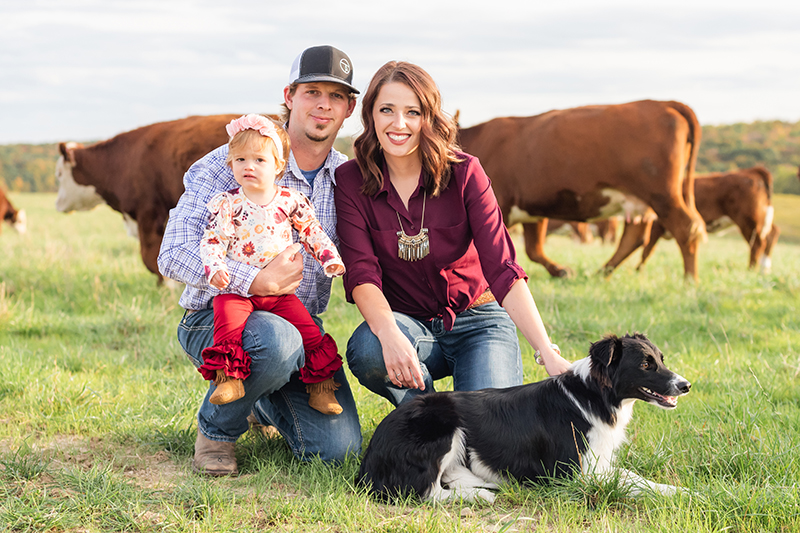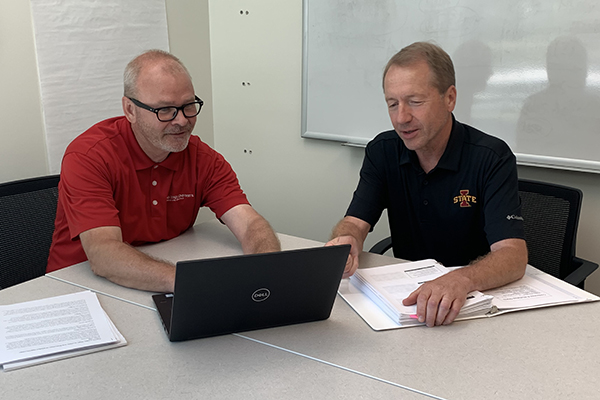
Helping local businesses thrives: ISU Extension and Outreach enterprise development specialists support Iowa entrepreneurs
Tina and Amos Troester know the value of producing quality, premium beef. They’ve seen steady growth in their cattle company since they began selling to family and friends six years ago.
But when COVID-19 came in the spring of 2020, they saw demand spike in ways that were totally new.
As the virus spread across the country, grocery stores, restaurants and meat processors all saw significant supply chain disruptions that led consumers to seek protein in different ways.
For the Troesters, who own T-A Cattle Co. and T-A Family Premium Meats in Garnavillo, Iowa, COVID was both a challenge and an opportunity.
The opportunity was with the demand for local meats. Large-scale packing plants were closing due to illness, grocery stores were limiting how much customers could purchase and consumers turned to local farmers to meet their needs.
The challenge, especially for young farmers like the Troesters, was adapting to the rapid change in demand. They saw a significant increase in the amount of meat customers were willing to purchase, causing their business to nearly double in 2020 and continue to steadily grow into 2021.
They quickly needed more storage, better delivery equipment and a better understanding of their customers and their business model in general.
Toward the end of 2020, the Troesters reached out to Iowa State University Extension and Outreach for help. They had previously been working with a different partner, but were not making the progress they needed.
New direction

ISU Extension and Outreach’s Brian Tapp, left, and Duane Johnson team up via the Farm, Food and Enterprise Development and the Community and Economic Development programs to help Iowans build their businesses.
That all changed when they spoke to Brian Tapp, enterprise development program coordinator with ISU Extension and Outreach’s Farm, Food and Enterprise Development program.
“When the Troesters first called me, they were looking for help with a feasibility study and a grant application,” says Tapp. “As we continued to talk, we took on the role of analyzing and benchmarking their business plan to determine how they could increase sales and grow their business.”
Under normal circumstances, it takes about 12-16 weeks for Tapp’s team to complete a feasibility study. But because COVID brought a sense of urgency, the study was completed in about six weeks.
“Brian was a lifesaver,” says Tina Troester. “He called back and said ‘we can absolutely help you now.’ He was very helpful with both the business plan and the feasibility study.”
With Tapp’s help, the Troesters were able to add a pole barn and a walk-in freezer capable of holding meat cuts of about 10 steers. They also added a new meat truck to help with frozen deliveries.
Broad outreach
The Troesters were among hundreds who turned to Tapp for help during COVID. Tapp and his team reached people across the state and beyond via 50 podcasts focused on business assistance, business recovery and reopening.
Known as the “Back to Business Iowa Podcasts,” these featured segments were produced in partnership with Farm, Food and Enterprise Development and the Community and Economic Development programs of ISU Extension and Outreach, along with the Iowa Small Business Development Centers.
The podcasts helped restaurants, grocery stores and small business owners make key decisions in a time that was both stressful and urgent. By offering financial insight and research, the group was able to help entrepreneurs understand their financial viability — not only during COVID, but also before and after.
“COVID definitely transitioned us to different levels of service than we had been providing and with the need for a much quicker turnaround,” Tapp says.
Resilient, market-ready
Andrew Schechinger, a junior at Iowa State University and an owner of FiberFactor Feeds, turned to Tapp in September of 2020, for help completing a feasibility study for his family’s business, which makes pelleted livestock feed for cattle, horses, sheep and goats.
Formerly known as Iowa Agricultural Bio Fibers, the company lost its feed mill to a fire in April 2020 and is seeking $6 million in financing to build a new plant and expand its product line.
“Brian and his team were great at learning about our industry and our business model, our product and our process,” says Schechinger, who is majoring in entrepreneurship at Iowa State.
Coupled with the disruptions of the pandemic and an increase in corn prices, they were able to keep their costs down and provide an alternative source of animal nutrition for the livestock industry.
“Farm, Food and Enterprise Development did a fantastic job of going through hundreds of documents and compiling all of our research and development and work into a feasibility study,” Schechinger says. “They laid out the important points to show how we have been successful and can be successful in the future.”
Troesters and others who Tapp has helped say their businesses are more resilient and market-ready than before.
Tina Troester said she’s hopeful some of the relationships made with customers and business partners will continue long after the virus fades.
She met people she likely wouldn’t have met otherwise, and customers got a taste for local foods and the farmer-to-consumer connection.
“People got to know farmers a little more and ask questions,” Tina Troester says. “I am very optimistic and excited about our own customers and the number of people who have been drawn out to the countryside and to the farm. We hope the trend will continue well into the future.”



